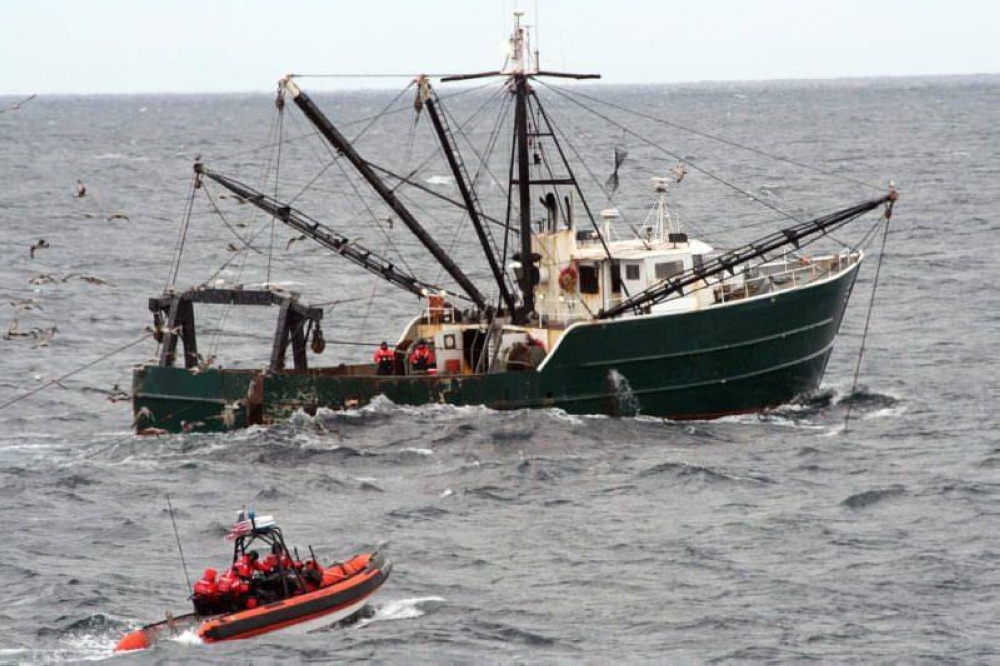Illegal fishing at South China Sea: Hotspots and losses
ABDUL RAZAK AHMAD25 Aug 2022 06:07pm

In 2020, the Malaysian Maritime Enforcement Agency detained six vessels for trespassing in national waters located in Tanjung Setapa, Kota Tinggi. All detained vessels were registered in Qinhuangdao, China. - AFP pic for illustration purposes
Malaysia loses up to RM4.25 billion in revenue every year in the wake of illegally fishing activities in the South China Sea. Malaysia has also suffered losses due to the encroachment by illegal foreign vessels mainly from China, followed by Vietnam, Thailand, and Indonesia.
As specified by Malaysia’s Fisheries Department, roughly 980,000 tonnes of the country’s seafood worth between RM3 billion and RM6 billion was lost annually on account of illegal fishing activities from 2017 to 2019, where only 50 per cent of the fish caught in the national waters makes its way into the domestic market.
In 2020, the Malaysian Maritime Enforcement Agency (MMEA) detained six vessels for trespassing in national waters located in Tanjung Setapa, Kota Tinggi.
All detained vessels were registered in Qinhuangdao, China and operated by six captains with 54 other Chinese nationals. Demonising China does nothing to untwine the contesting claims on the waters of the fish-rich South China Sea. China set the seal on its fishing militia — they are consistently at the vanguard of defending its territorial claim, securing subsidies and strong logistical support.
Tensions have escalated and unveiled a worrying narrative about the impact fishing fleets have in the region.
The Hague-based Permanent Court of Arbitration (PCA) declared that China has no historical entitlement over waters and resources in the South China Sea.
Beijing does not concede the legitimacy of the PCA’s verdict and has continued to operate as if it owns the entirety of the South China Sea.
Moreover, legal and diplomatic support for China’s fishing militia has extended to China’s supreme court.
It has announced that foreign fishermen caught operating in its claimed waters will be prosecuted, where they could spend up to a year in prison.
China's ruling makes it clear that Malaysia and other Southeast Asian claimants in the region should expect more encroachment from their fishing militia.
This showcases China blatantly violating international law by utilising both its naval and civilian fleets to assert its claims.
Data shows that China is promptly building dual-purpose artificial islands atop reefs in the sea.
Constructing infrastructure, lighthouses, and deep-water ports on these islands supports its fishing militia whilst simultaneously safeguarding the claimed nine-dash line.
In 2016, the Sanya city government officially built a fishing port situated in Yazhou, Hainan Province to host fishing vessels operating in the disputed South China Sea. The port traverses 1063 metres and locates 11 functional anchorages that accommodate a fleet of 800 fishing boats and are further expected to handle 2,000 more further down the line.
According to data published by the Flanders Marine Institute, fishing activity by vessels between April and May 2020 that have activated their Automatic Identification Systems (AIS) show that China is high up in the list scoring a reading of 3.93, followed by Taiwan (3.43) and Cambodia (3.23).
However, satellites detecting ships’ lights show higher numbers of fleets fishing in the disputed areas than officially reported. China's illegal fishing activities in the region have caused fish stock to diminish quickly.
Overfishing has resulted in many Malaysian fishermen calling it quits — many based in hotspots such as Kemaman in Terengganu as well as Kuala Sedili and Mersing in Johor.
Overlapping territorial and maritime disputes prevent effective enforcement of domestic fishery laws as well as disrupt cooperation amongst regional states.
However, crucial measures such as managing fisheries and conducting stock assessments are possible if Malaysia and other Asean countries take initiative by holding joint patrols and strengthening maritime security, particularly at the southern tip of the heavily contested South China Sea.
Measures taken by Asean states must consider sharing technological advancements that assist in monitoring law-breaking foreign fishers.
Malaysia is known to have strong economic and diplomatic-centric relations with China.
Since the two nations established diplomatic ties in 1974, they have carried out pragmatic cooperation in multiple fields which serves mutual benefit for advanced development to achieve a better-shared future.
China has remained Malaysia’s top trading partner for 13 consecutive years and in 2021, bilateral trade between China and Malaysia reached a new high, increasing 34.5 percent to US$176.8 billion.
Despite the positive ties with China, Malaysia has missed the opportunity to defend its national interest in the South China Sea during Chinese Foreign Minister Wang Yi’s recent visit.
Malaysia was silent on the issue of Chinese territorial violations, specifically in the South China Sea.
In addition to the encroachment of Chinese vessels into Malaysian waters, Malaysia has failed to raise the issue of extensive illegal fishing, causing a shortage of edible marine supplies — resulting in increasingly high food prices.
There was no remark made in regards to Malaysia's reiteration of its commitment to upholding the freedom of navigation of the Sea.
The pressures of ensuring a real, live and substantive relationship with China are greater than ever.
Although Malaysia remains committed to maintaining public displays of cordial ties with China, being inferior to one of the great maritime powers is incongruous with our principle to protect our territorial integrity.
The encroachment of foreign vessels into Malaysian waters and illegal fishing activities must not be swept under the rug. The deafening silence of our government on this matter is no longer an option.
Malaysia must be firm on highlighting this issue with China while maintaining our good diplomatic relations, albeit the latter's strong aversion to resolving maritime disputes.
Our government must be committed to upholding Malaysia’s national interest by re-examining its South China Sea policy to safeguard our territorial integrity within this region.
Dr Abdul Razak Ahmad is the founding director of Bait Al Amanah.
The views expressed in this article are the author's own and do not necessarily reflect those of Sinar Daily.
Download Sinar Daily application.Click Here!














